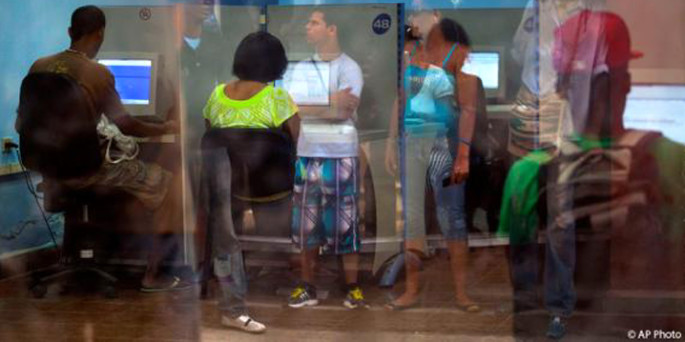
Toward a digitally connected Cuba
Cuba is the most digitally dark pocket in our hemisphere. Less than five percent of its 11 million people have access to the global Internet, and only two million have access to mobile communications services, and that’s only on a second generation (2G) network. The infrastructure needs development, and services are extremely limited and expensive where available. The island remains disconnected from the Information Age, holding back the promise of the Cuban people. This state of affairs is a function of policy and politics, and we are taking action to ensure that we are not part of the problem, but to instead offer incentives to find solutions.
Five months ago, President Obama announced a new direction in our Cuba policy, which included a forward-looking approach to increase connectivity on the island. Last week, Senators Udall, Flake, Durbin, and Enzi introduced bipartisan legislation to give Congress’s imprimatur to those changes in telecommunications and Internet-related licensing policy, and to create certainty for industry that the time to engage in the process of helping Cuba connect to the rest of the world is now. We thank the Senators for their leadership and applaud their work.
Titled the “Cuba Digital and Telecommunications Advancement Act” (the “Cuba DATA Act”), the legislation would reaffirm the authority of the President to permit exports of telecommunications and technology services and infrastructure to Cuba. The proposal sends a strong bipartisan signal to markets and the Cuban people that the United States is committed to helping bring the island’s digital isolation to an end, and is an important step towards facilitating expanded telecommunication services and relevant technology to the country.
In March, I led a small interagency team to Havana to discuss the new U.S. approach with our Cuban counterparts, and to get a better sense of Cuba’s Internet and communications connectivity needs. We now have a clearer understanding of Cuba’s goals; for example, its ambition to hitting globally agreed targets for communications penetration for developing countries by 2020. Cuba also expressed interest in roaming agreements with U.S. companies, and is open to discussing interconnection agreements enabling full access to the Internet.
Provided that Cuba is a willing partner, the President’s policy and the DATA Act would enable American investment in an undersea cable to connect Miami and Havana and the sale of equipment and services to Cuba, developments that wouldhelp upgrade the wired and wireless networks on the island and the delivery of telecommunications and Internet connectivity services to Cuba. With Internet-based services for personal communications and social networking authorized as well, Cubans and Americans could be connecting through Skype sessions and establishing Facebook relationships as a matter of course.
We received a warm reception in Cuba and had wide-ranging, frank conversations. The Cuban people want access to the Internet, the same access that their neighbors in the region and so many people around the world enjoy. They know that without that connectivity, they are being left behind. The Cuban government expressed its desire to build-out its communications infrastructure steadily and carefully over the coming years. We underscored our belief that markets open to foreign investment and competition, and committed to providing unfettered access to the Internet, have had the greatest success in achieving broad connectivity and in reaping the associated economic and social development gains.
As a follow up to our trip, we proposed next steps to the Cubans; offering potential trips by U.S. private sector experts to focus on how the development of telecommunications infrastructure and new regulatory approaches could expand availability of services for the Cuban people, and how Internet delivered services enable and encourage economic development. We are also exploring academic exchanges and the possibility of working through the International Telecommunication Union to support a regional dialogue on connectivity in Cuba.
Our interest is strong and we appreciate the momentum that legislation like the Cuba DATA Act can generate. Engagement and the exchange of ideas and communication over air and wire can help make us better neighbors, create opportunity in Cuba, and carve a new future for generations to come on either side of the Florida Straits.
* Ambassador Daniel Sepulveda serves as Deputy Assistant Secretary of State and U.S. Coordinator for International Communications and Information Policy in the State Department’s Bureau of Economic and Business Affairs.
(From: DIPNOTE)


